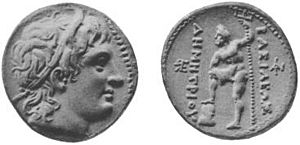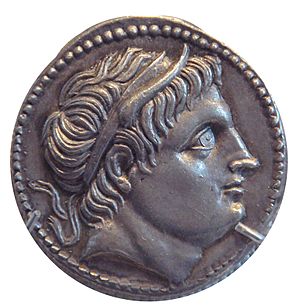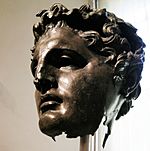Demetrius I of Macedon facts for kids
Quick facts for kids Demetrius I Poliorcetes |
|
|---|---|
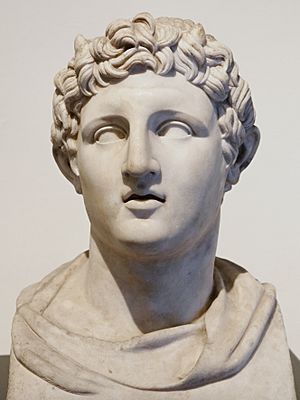
Marble bust of Demetrius I Poliorcetes. Roman copy from 1st century AD of a Greek original from 3rd century BC
|
|
| King of Macedonia | |
| Reign | 294–288 BC |
| Predecessor | Antipater I of Macedon |
| Successor | Lysimachus and Pyrrhus of Epirus |
| Hegemon of the Hellenic League | |
| Reign | 304 BC |
| Predecessor | Alexander the Great |
| Successor | Antigonus III Doson |
| Born | 337 BC |
| Died | 283 BC (aged 53–54) |
| Spouse |
|
| Issue |
|
| House | Antigonid dynasty |
| Father | Antigonus I Monophthalmus |
| Mother | Stratonice |
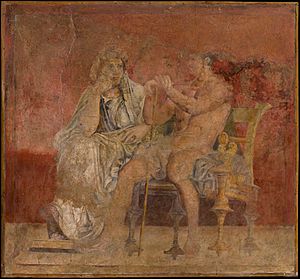
Demetrius I (born 337 BC, died 283 BC) was a powerful Macedonian nobleman and military leader. He later became the King of Macedon from 294 to 288 BC. He was also known as Poliorcetes, which means "The Besieger". This nickname came from his skill in attacking and capturing cities. Demetrius was part of the Antigonid dynasty, a family that ruled Macedonia. He was the son of Antigonus I Monophthalmus and Stratonice.
Contents
Demetrius's Life and Adventures
Starting His Career
Demetrius began his military career fighting alongside his father, Antigonus I Monophthalmus. This was during a major conflict called the Second War of the Diadochi. He led the cavalry (soldiers on horseback) in the Battle of Paraitakene. Even though his father's army faced tough challenges, Demetrius's success helped prevent a complete defeat.
He was also present at the important Battle of Gabiene. After this battle, Demetrius was one of the few who asked his father to spare the life of a captured general, Eumenes.
When he was 22, his father left him to defend Syria against Ptolemy I Soter. Demetrius lost a battle at Gaza. However, he quickly won another battle nearby, making up for some of his losses. Later, he tried to remove Seleucus I Nicator from Babylon but was defeated. This led to his father losing a large part of his empire to Seleucus.
Battles and Victories
Demetrius fought several campaigns against Ptolemy near Cilicia and Cyprus. Then, he sailed to Athens with a large fleet of 250 ships. He freed Athens from the control of Cassander and Ptolemy. He also removed the soldiers stationed there and captured Munychia in 307 BC. Because of these victories, the Athenians honored him as a "Saviour" (Soter).
In 306 BC, Demetrius sailed to Cyprus. He won a major naval battle, the Battle of Salamis, against Ptolemy's forces. This victory greatly weakened Ptolemy's navy. After this success, Demetrius conquered Cyprus. Following this, both Demetrius and his father, Antigonus, were given the title of "king."
The Besieger's Nickname
In 305 BC, Demetrius tried to attack the city of Rhodes. He was famous for inventing new siege engines (machines used to attack walled cities). These amazing machines earned him the nickname "Poliorcetes" (The Besieger). One of his creations was a battering ram 55 meters (180 feet) long, which needed 1,000 men to move it! He also built a huge wheeled siege tower called "Helepolis" (or "Taker of Cities"). It was 38 meters (125 feet) tall and 18 meters (60 feet) wide, weighing 163,000 kilograms (360,000 pounds). Even with these amazing machines, he couldn't conquer Rhodes. The people of Rhodes later used the bronze from his abandoned siege weapons to build the famous Colossus of Rhodes.
In 304 BC, Demetrius returned to Greece and helped restart the Corinthian League. However, his behavior caused some people in Athens to wish for the return of Cassander's rule.
Challenges and New Alliances
Demetrius's power made other leaders, like Seleucus, Cassander, and Lysimachus, worried. They joined forces to defeat him and his father. Their armies met at the Battle of Ipsus in Phrygia in 301 BC. In this battle, Antigonus was killed. Demetrius suffered heavy losses and had to retreat.
This defeat led to many enemies turning against him. The Athenians even refused to let him into their city. But Demetrius soon fought back. He attacked the lands of Lysimachus and made peace with Seleucus. To strengthen this peace, he gave his daughter Stratonice to Seleucus in marriage.
Athens was then ruled by a leader named Lachares. Demetrius besieged Athens for a long time and finally captured the city in 294 BC. He showed great mercy to the people of Athens, which he believed was an important quality for a ruler. After taking Athens, Demetrius set up a new government.
Becoming King of Macedonia
In 294 BC, Demetrius became the King of Macedonia. He took the throne after Alexander V of Macedon died. He faced a rebellion from the people of Boeotia but secured the region after capturing Thebes in 291 BC. That same year, he married Lanassa, who was the former wife of Pyrrhus of Epirus.
His rule in Macedonia was constantly threatened by Pyrrhus. Pyrrhus would attack Demetrius's kingdom when he was away. Eventually, the combined forces of Pyrrhus, Ptolemy, and Lysimachus, along with unhappy people in his own kingdom, forced Demetrius to leave Macedonia in 288 BC.
After trying to besiege Athens without success, Demetrius went to Asia. He attacked some areas belonging to Lysimachus. Lysimachus's son, Agathocles, avoided direct battles. Instead, he used blockades, which led to famine and disease in Demetrius's army.
Demetrius was trapped in Cilicia and asked Seleucus for help. However, Seleucus changed his mind, and they began fighting. After some initial successes, Demetrius was completely abandoned by his soldiers. He was forced to surrender to Seleucus. He was then placed under house arrest, treated with respect as a prince.
His son, Antigonus, offered Seleucus all his possessions to free his father. But it was no use. Demetrius died of sadness after being held captive for three years in 283 BC. His body was given to Antigonus and was honored with a grand funeral in Corinth. Demetrius's family continued to rule Macedonia until the time of Perseus of Macedon. Macedonia was then conquered by the Romans in 168 BC.
Demetrius's Family
Demetrius was married five times:
- His first wife was Phila. They had two children: Stratonice of Syria and Antigonus II Gonatas.
- His second wife was Eurydice of Athens. They had a son named Corrhabus.
- His third wife was Deidamia, who was the sister of Pyrrhus of Epirus. Deidamia had a son named Alexander.
- His fourth wife was Lanassa, who had been married to his brother-in-law Pyrrhus.
- His fifth wife was Ptolemais, the daughter of Ptolemy I Soter. They had a son named Demetrius the Fair.
See also
 In Spanish: Demetrio I de Macedonia para niños
In Spanish: Demetrio I de Macedonia para niños
Sources
Ancient sources
- Plutarch, Life of Demetrius
- Diodorus Siculus, Library of History, books 19–21
- Polyaenus, Stratagems, 4.7
- Justin, Epitome of Trogus, books 15–16
- Athenaeus, Deipnosophists, 6.252–255
Modern works
- Pat Wheatley, Charlotte Dunn : Demetrius the Besieger. Oxford University Press, Oxford 2020, ISBN: 978-0-198-83604-9.
- R. M. Errington, A History of the Hellenistic World, pp. 33–58. Blackwell Publishing (2008). ISBN: 978-0-631-23388-6.
- Demetrius I at Livius.org
| Regnal titles | ||
|---|---|---|
| Preceded by Antigonus I Monophthalmus |
Antigonid dynasty | Succeeded by Antigonus II Gonatas |
| Preceded by Antipater II of Macedon |
King of Macedon 294–288 BC |
Succeeded by Lysimachus and Pyrrhus of Epirus |
 | Anna J. Cooper |
 | Mary McLeod Bethune |
 | Lillie Mae Bradford |


